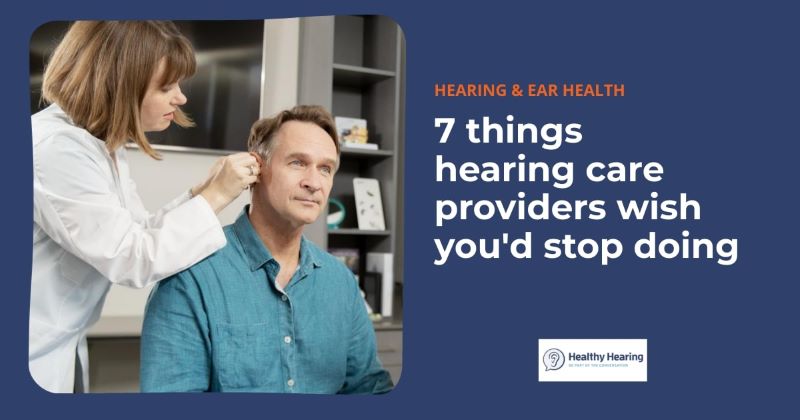|
www.HealthyHearing.com |
Stop doing these 7 things, audiologists and hearing specialists sayAvoiding treatment, putting things in your ears, and more no-nos
Contributed by Madeleine Burry If you’re thinking of putting something in your ear — whether it’s your pinky, a cotton bud, or an internet-advertised tiny camera — hearing experts are united in wishing you’d reconsider. But it’s not just a matter of digging in your own ears, mowing the lawn without hearing protection, or keeping the volume on headphones cranked to the max. Below, some common habits hearing pros would prefer you dial back on or stop altogether.
Don’t: Put items in your ear - including ear canal camerasCalifornia-based audiologist Patty Anderson has seen patients put a lot of items in their ear: cotton buds, of course, despite the box typically saying “Do not insert swab into ear canal,” as well as batteries, pen caps, shimmery gemstones from a crafting hour, bobby pins, and tiny spoons aimed at digging out earwax. “People will put just about anything in their ears, honestly,” she says. These days, that includes ear canal cameras, a current trend. But it’s a habit that’s best avoided. Putting a something in your ear, like a cotton swab (Q-Tips) can potentially perforate your eardrum (ouch!). Plus, you’re likely not accomplishing your desired goal. The ear’s anatomy is designed to be self-cleaning, Anderson says. Yes, when you put something in your ear, you may get out wax, but that’s because skin sheds toward the exit of the ear canal, she explains. When you use a cotton bud — or any other object — to get out wax, the end result is that you push much of it deeper into your ear canal. That said, Anderson knows that many people will read this, and still persist in wanting to clean out their ear. If that’s the case for you, here’s her advice: First, some people have very small ears, twisty turning bends in their ear that prevent the wax from exiting on its own, or produce a lot of wax. These people may need to see a professional for ear cleaning, and she recommends getting regular care from an ENT. And, if you simply cannot resist the urge to use a cotton bud, try to be mindful of how much of it is entering your ear, and don’t go too deep. Don’t: Put off that appointment — or self-treat“A lot of patients will wait to seek help,” says Brittany Sims, hearing aid specialist in the Dallas area. Many people only make their way to a hearing clinic appointment because their spouse or partner gives them a push. There may be a variety of reasons why people delay: associating hearing loss with age, not recognizing the severity of the problem, or concern over the cost of hearing aids. But the end result is putting off treatment that can help you hear and communicate better. “Don’t ignore your early signs of hearing loss,” Sims says. Read more: How often should I get my hearing tested? Another "don't" is self-diagnosing. While online hearing tests are easy to find and the market for over-the-counter hearing aids is exploding, Paige Gainey, AuD, CCC-A, of the Texas-based Total Hearing Care, generally recommends treading carefully. This is because you may get the sound settings wrong -- either over-amplifying or under-amplifying. If the sound is too loud, you risk causing more hearing loss, she notes. And, "whenever you’re under-amplified, your neutrons can weaken, atrophy, and die because they’re not being stimulated." (Here’s more on the changes that occur in your brain when you experience hearing loss.) Plus, in some cases, hearing loss might be due to wax buildup, so taking an online hearing test won’t lead to the correct insights. “We really need to have a physical eye on your eardrum before diagnosing and treating,” Gainey says. Don’t: Compare your hearing to others’ situationsOur experts agree: When it comes to hearing, comparing yourself to others isn’t helpful. Think of it like taste buds, Gainey says. You may eat the same dinner as another person, but you’ll experience the taste of the food differently. Hearing is complex: Sound goes through your ear, but you interpret it with your brain, Gainey says. “Your brain is like a fingerprint,” she says — that is, it’s unique. Two people may have the same audiogram, but will still hear differently in the same environment. “I could have 10 audiograms, [and on paper], it could be identical,” Anderson says. But the functional impact and outcome may be quite different based on how people use their hearing aids, and how they opt to manage their hearing loss, she says. Habits audiologists wish you’d avoid if you wear hearing aidsDon’t: Skip nightly cleaningAudiologists frequently see people who skip cleaning their hearing aids daily. It’s understandable: First off, this can be a bit of a tedious task. And, for older adults or anyone with vision issues, seeing the small parts can be tricky, Anderson says. Follow these step-by-step instructions for how to clean your hearing aids, plus explore tips for removing wax from hearing aids. Keep in mind that your audiologist may be able to help. Some clinics have walk-in appointments, when you can get help with small tasks (cleaning hearing aids, swapping out batteries) that may be challenging due to dexterity or vision, Anderson says. Don’t: Go to appointments alone
Your hearing aids can be custom-programmed to hear them better. “We always ask patients to bring a loved one with them to an appointment,” Gainey says. For one thing, it’s helpful to have someone there as you take in a lot of complicated information about a new medical device, and how it interfaces with other technology in your life (like your phone, speakers, or television). Plus, your audiologist can use the person’s voice to help program the hearing aid, Gainey points out. So if you have a very soft-spoken partner, your audiologist will program the hearing aid to the pitch of their voice, Gainey says. Don’t: Skip the follow-up appointmentWhen it comes to hearing aids, you’ll likely need a few appointments — particularly if you’re a new hearing aid user, Gainey says. At the follow-up appointments, you’ll get adjustments to your hearing aids that take into account your specific feedback. This is your moment to call out if you struggle to hear in a particular setting, finding connecting to Bluetooth confusing, or anything else that might be preventing you from wearing or getting the most out of your hearing aids. Think of the addition of hearing aids as a journey, not a one-and-done moment, Gainey says. “If there’s something you’re noticing, write it down and share that information with me,” Anderson says. “The more information someone shares with me...the more I can customize their hearing aids to meet what their needs are,” she says. Perhaps, Anderson says, some people avoid giving feedback for fear of it being taken personally. Skip that mentality! If someone tells her that they hate their hearing aids, Anderson’s response is to look for solutions. “Almost everything is fixable. We just have to know what to fix,” she says. Read more: 7 tips for getting used to your new hearing aids Don’t: Use your hearing aids sporadically
“We have some patients that will come in and say, ‘Well, you know, I only put them on whenever I'm going to go out to a restaurant, and then they don't perform well,’” Gainey says. But in fact, hearing aids should be worn “all day, every day, when they’re awake,” she says. That way, you’ll train your brain and it’ll be better equipped to handle tricky listening situations, like dinner in a restaurant. “If you’re not using that muscle, then you’re not going to be able to hear successfully in difficult environments,” Gainey says. Bottom line: Consistency matters when it comes to using hearing aids. Even if you’re all alone, there are benefits to having hearing aids in, Anderson says. This is a challenging message for hearing specialists to convey; Anderson’s own mom will take hers off when there’s no one around. But, as Anderson points out, wearing hearing aids can help her mom with her bothersome tinnitus. And wearing hearing aids can help you hear the environment around you and gain environmental awareness, she says. Stimulating that system helps keep it active and engaged, and also makes communication easier, Anderson says. Read more: Should you wear hearing aids all the time? Madeleine Burry
|
Featured clinics near me
Earzlink Hearing Care - Reynoldsburg
7668 Slate Ridge Blvd
Reynoldsburg, OH 43068

Find a clinic
We have more hearing clinic reviews than any other site!



.png)
 Madeleine Burry is a Brooklyn-based freelance writer and editor. She's written about health for several online publications, including Women's Health, Prevention, Health, Livestrong and Good Housekeeping. You can follow her on Twitter @lovelanewest.
Madeleine Burry is a Brooklyn-based freelance writer and editor. She's written about health for several online publications, including Women's Health, Prevention, Health, Livestrong and Good Housekeeping. You can follow her on Twitter @lovelanewest.